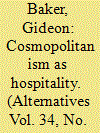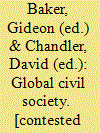|
|
|
Sort Order |
|
|
|
Items / Page
|
|
|
|
|
|
|
| Srl | Item |
| 1 |
ID:
091711


|
|
|
|
|
| Publication |
2009.
|
| Summary/Abstract |
For many cosmopolitans, an emergent global civil society is reframing the relationship between the universal and particular in world politics in ways that do justice to both. This article disputes this claim, finding that the concept of global civil society shares the same fundamental problem as state sovereignty, namely that it is better at articulating global identity than difference because it reproduces in different form statist attempts to describe a universal structure of particularity. It then argues that to avoid reducing difference to identity while remaining true to the cosmopolitan impulse to ethical universality, that is, to recognition of moral obligations to foreigners, it is necessary to take cosmopolitanism as synonymous with an ethics of hospitality enabling a nondialectical account of identity and difference in cosmopolitanism. As Derrida affirms, hospitality deconstructs the binary of identity and difference in our ethical relations with strangers. This dialectic-defying quality of cosmopolitanism-as-hospitality requires a greater decisionism than dialectical liberal-cosmopolitanism, turning cosmopolitanism away from the pure ethics of its liberal variants and transforming it into an ethicopolitics.
|
|
|
|
|
|
|
|
|
|
|
|
|
|
|
|
| 2 |
ID:
095986


|
|
|
|
|
| Publication |
2010.
|
| Summary/Abstract |
By way of a discussion of the deliberately hard case of humanitarian intervention, this article considers the merits of an alternative cosmopolitan ethics to that of liberal cosmopolitanism, one which founds its universalism on an ethics of hospitality rather than the rights of man. Jacques Derrida describes the ethics of hospitality as defined by an unconditional welcome which nonetheless must become conditional in order to function. This leads to a profound paradox - an 'undecidability' - in the practice of the ethics of hospitality, the implications of which need to be better understood if the ambition of 'another cosmopolitanism' is to be realised. Interrogating the ethics of hospitality and the undecidability to which it gives rise in relation to humanitarian intervention, it is argued that responsibilities to others, which sometimes imply intervention, must always be kept in tension with openness to the coming of the Other, which limits intervention. Far from being blind or paralysing action, such 'bounded undecidability', it is suggested, actually defines the site of responsible, just decisions in humanitarian intervention.
|
|
|
|
|
|
|
|
|
|
|
|
|
|
|
|
| 3 |
ID:
059989


|
|
|
|
|
| Publication |
Abingdon, Routledge, 2005.
|
| Description |
xi, 205p.
|
| Series |
Routledge advances in international relations and global politics; no. 32
|
| Standard Number |
0415354803
|
|
|
|
|
|
|
|
|
|
|
|
Copies: C:1/I:0,R:0,Q:0
Circulation
| Accession# | Call# | Current Location | Status | Policy | Location |
| 049334 | 300/BAK 049334 | Main | On Shelf | General | |
|
|
|
|
| 4 |
ID:
105656


|
|
|
|
|
| Publication |
2011.
|
| Summary/Abstract |
This article explores the account of international hospitality found in the natural law tradition from Vitoria to Kant. Rather than limit itself to intellectual history, the focus here is on a more enduring theme: the double-bind of hospitality which the natural lawyers encountered in seeking to find a place for the welcome of the foreigner in the 'law of nations'. Although these thinkers agreed on a natural right of communication, this proved destabilising, even destructive, of the property claims by which hosts establish their domain as properly theirs in the first place. All struggled with this double-bind, though this took different forms, from the concern that the law of hospitality might thereby justify colonial appropriation to fears for how it could threaten sovereignty. Two thinkers arguably find a way out of the double-bind of right of communication-right of property in hospitality, but sacrifice the law of hospitality in the process: Pufendorf, subordinating communication to property, turns hospitality into charity and thereby effectively denies it status as a law of nature; Kant, putting communication first, makes hospitality a matter of right, not philanthropy, but also sees it as instrumental to the development of a global civil condition, where it would be redundant.
|
|
|
|
|
|
|
|
|
|
|
|
|
|
|
|
|
|
|
|
|